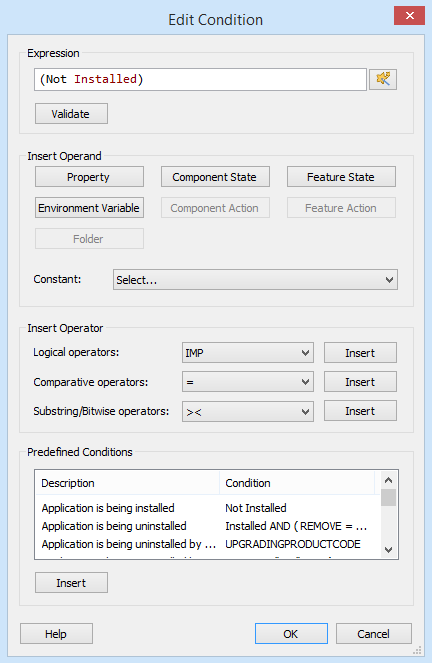
Improving Interaction Quality Through Effective 'Preferences Configuration Interface'

Improving Interaction Quality Through Effective ‘Preferences Configuration Interface’
Table of Contents
- Introduction
- Registration
- Using Advanced Installer
- GUI
- Working with Projects
- Installer Project
* Product Information
* Resources
* Package Definition
* Requirements
* User Interface
* System Changes
* Server
* Custom Behavior
* Search
* Properties Page
* Custom Actions
* Custom Action Properties
* Edit Action Properties Dialog
* Edit Condition Dialog
* Predefined Conditions
* Detect Installed Software
* Detect Installed Office App
* Advanced Execution Scenarios Dialog
* Custom Actions List
* Table Editor - Patch Project
- Merge Module Project
- Updates Configuration Project
- Windows Store App Project
- Modification Package Project
- Optional Package Project
- Windows Mobile CAB Projects
- Visual Studio Extension Project
- Software Installer Wizards - Advanced Installer
- Visual Studio integration
- Alternative to AdminStudio/Wise
- Replace Wise
- Migrating from Visual Studio Installer
- Keyboard Shortcuts
- Shell Integration
- Command Line
- Advanced Installer PowerShell Automation Interfaces
- Features and Functionality
- Tutorials
- Samples
- How-tos
- FAQs
- Windows Installer
- Deployment Technologies
- IT Pro
- MSIX
- Video Tutorials
- Advanced Installer Blog
- Table of Contents
Disclaimer: This post includes affiliate links
If you click on a link and make a purchase, I may receive a commission at no extra cost to you.
Edit Condition Dialog
This dialog allows you to edit a conditional statement.

- 1. Expression
- 2. Insert Operand
- 2.1 Property
- 2.2 Environment Variables
- 2.3 Folder
- 2.4 Component Action
- 2.5 Component State
- 2.6 Feature Action
- 2.7 Feature State
- 2.8 Constant
- 3. Insert Operator
- 4. Predefined conditions
1. Expression
This field contains the resulted conditional statement and can also be edited using Smart Condition Edit Control . Use the [Validate ] button to validate it.
If the condition is invalid, you will be prompted with an error message that will indicate the error’s beginning.
2. Insert Operand
This section allows you to insert operands in the statement.
2.1 Property
Insert reference to an installer property which is already created in your package.
Example: MY_PROP
This condition will be true only if the property MY_PROP contains a value. If the property is empty the condition is not fulfilled.
2.2 Environment Variables
Insert reference to an environment variable.
Example: %JAVA_HOME
This condition will be true only if the environment variable JAVA_HOME exists on the machine on which the package is running. If JAVA_HOME doesn’t exist the condition will not be met.
2.3 Folder
Insert reference to an installation folder.
Example: APPDIR
This condition will be true only if the property APPDIR which is assigned to the Application Folder from the Files and Folders is resolved.
2.4 Component Action
Insert a reference to the action state of a component (for example if a component will be installed or not).
Example: $Your_Component=3
Test if the correspondent component will be installed on the machine.
2.5 Component State
Insert reference to the installed state of a component (for example if a component is already installed when the installation runs).
Example: ?Your_Component=3
This condition will be true only if the correspondent component was installed. For example you have a custom action which unregister a certain DLL file with the attached component. If the component wasn’t installed the custom action will not run during uninstall, otherwise the custom action will be executed.
2.6 Feature Action
Insert reference to the action state of a feature (for example if a feature will be installed or not).
Example: &Feature=5
Test if the correspondent feature will be reinstalled on the machine.
2.7 Feature State
Insert reference to the installed state of a feature (for example if a feature is already installed when the installation runs).
Example: !Feature=3
This condition will be true only if the feature is already installed on the machine.
2.8 Constant
Add a constant to the conditional statement.
These constants represent the feature and component state values used in conditional expressions.
You can use the following:
- INSTALLSTATE_UNKNOWN (-1) - No action to be taken on the feature or component.
- INSTALLSTATE_ADVERTISED (1) - Advertised feature. This state is not available for components.
- INSTALLSTATE_ABSENT (2) - Feature or component is not present.
- INSTALLSTATE_LOCAL (3) - Feature or component is on the local computer.
- INSTALLSTATE_SOURCE (4) - Feature or component will run from the source.
Example: &Feature=3
This condition will be true only if the feature “Feature” will be installed locally. If the feature is not selected for installation the condition is false.
3. Insert Operator
In this section you can insert operators in the conditional statement. Use the [Insert ] button to add the selected one.
3.1 Logical operators:
- IMP - TRUE if left term is FALSE or right term is TRUE.
- EQV - TRUE if both terms are TRUE or both terms are FALSE.
- XOR - TRUE if either but not both terms are TRUE.
- OR - TRUE if either or both terms are TRUE.
- AND - TRUE if both terms are TRUE.
- NOT - Unary operator; inverts state of following term.
3.2 Comparative operators:
- = - TRUE if left value is equal to right value.
- ~= - TRUE if left value is equal to right value. The comparison is case insensitive.
- <> - TRUE if left value is not equal to right value.
- ~<> - TRUE if left value is not equal to right value. The comparison is case insensitive.
- > - TRUE if left value is greater than right value.
- ~> - TRUE if left value is greater than right value. The comparison is case insensitive.
- >= - TRUE if left value is greater than or equal to right value.
- ~>= - TRUE if left value is greater than or equal to right value. The comparison is case insensitive.
- < - TRUE if left value is less than right value.
- ~< - TRUE if left value is less than right value. The comparison is case insensitive.
- <= - TRUE if left value is less than or equal to right value.
- ~<= - TRUE if left value is less than or equal to right value. The comparison is case insensitive.
3.3 Sub-String/Bitwise Operators
Substring operators can occur between two string values.
- >< - TRUE if left string contains the right string.
- ~>< - TRUE if left string contains the right string. The comparison is case insensitive.
- << - TRUE if left string starts with the right string.
- ~<< - TRUE if left string starts with the right string. The comparison is case insensitive.
- >> - TRUE if left string ends with the right string.
- ~>> - TRUE if left string ends with the right string. The comparison is case insensitive.
Bitwise operators can be used between two integer values.
- >< - TRUE if the left and right integers have any bits in common.
- << - TRUE if the left integer’s high 16-bits are equal to the right integer.
- >> - TRUE if the left integer’s low 16-bits are equal to the right integer.
4. Predefined conditions
This section is described in the Predefined Conditions article.
Topics
- Predefined Conditions
Predefined conditions ready to be used. - Detect Installed Software
Add a condition to determine the minimum installed software version. - Detect Installed Office App
Add a condition to determine the minimum installed Microsoft Office App version.
Did you find this page useful?
Please give it a rating:
Thanks!
Report a problem on this page
Information is incorrect or missing
Information is unclear or confusing
Something else
Can you tell us what’s wrong?
Send message
Also read:
- [New] Android Lightroom A Complete and Detailed Review for 2024
- [New] Panasonic HX-A1 Revolutionizing Wearable Cameras for the Outdoors for 2024
- [New] Transform Viewing Experience Adding Subtitles on Windows Media Player
- [Updated] 2024 Approved Navigating Through Social Streams Securing Your Status Videos
- [Updated] Enhance Tweet Management The Most Effective Apps for Tweets
- A Quick Guide to Nokia C12 Pro FRP Bypass Instantly
- Bypass Windows Update Trouble: Clearing Code 8007000E with Ease
- Customize Data Sources in Property Editing Panel
- Easy Guide on How to Record Songs From Apple Music Streaming
- Easy Methods to Set Any Image as White Background Using Your iPhone
- Easy Tutorial on Reflecting Android Display on an LG Smart Television
- Guide: Mastering the Game of Honkai Impact 3 on Your Windows Machine
- Recover Lost Data: Restore Deleted Photos & Documents From Your Android Phone with SD Card Recovery
- Tips for a Full-Screen Facebook Video Experience for 2024
- Top Tips for Downloading and Playing MP3 Audio on an iPad Device
- Title: Improving Interaction Quality Through Effective 'Preferences Configuration Interface'
- Author: David
- Created at : 2024-10-04 20:33:05
- Updated at : 2024-10-10 17:03:18
- Link: https://fox-zaraz.techidaily.com/improving-interaction-quality-through-effective-preferences-configuration-interface/
- License: This work is licensed under CC BY-NC-SA 4.0.